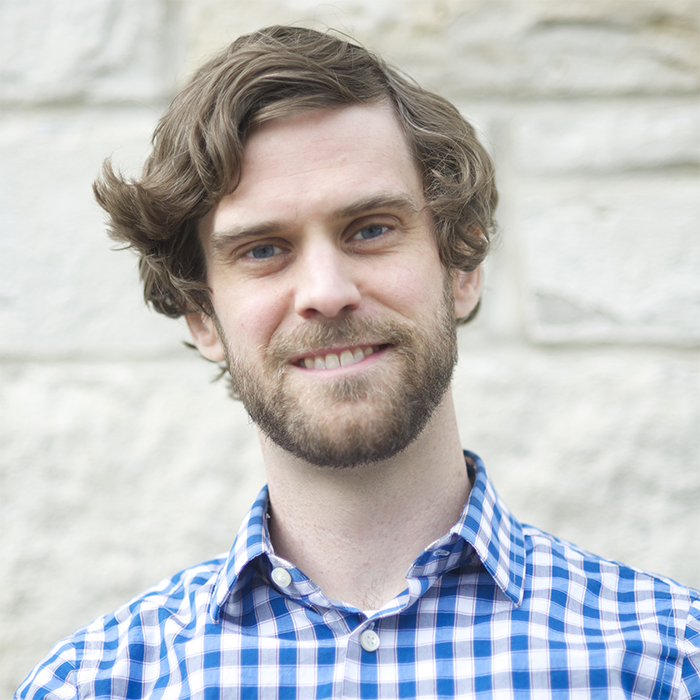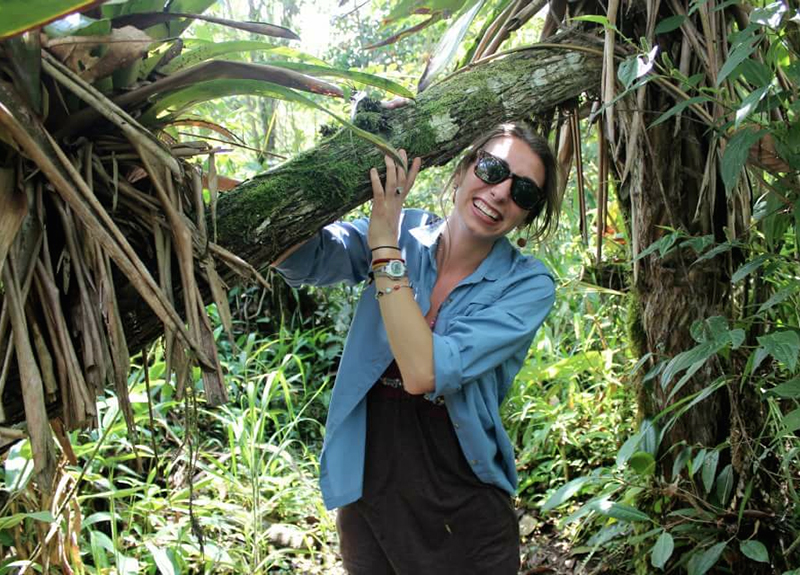Northwestern University’s class of 2019 will be graduating this week having acquired new skills and perspectives to help solve the world’s most pressing challenges. And few are more pressing than those related to sustainability and energy. From climate change and water insecurity to battery science and agriculture, learn how some of Northwestern’s newest alumni are using their degrees to build a more sustainable future.
Borrowing Lessons from Nature
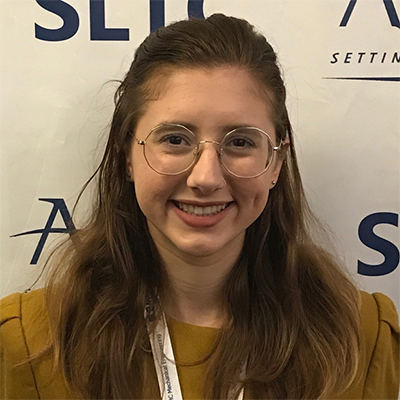 Allison O'Donnell is graduating with a bachelor's degree in Mechanical Engineering from Northwestern's McCormick School of Engineering and Applied Science.
Allison O'Donnell is graduating with a bachelor's degree in Mechanical Engineering from Northwestern's McCormick School of Engineering and Applied Science.
What are your plans after graduation?
The day after graduation, I'll be leaving for a trip to Italy with my mom. Soon after I get back, I will leave for a two week camping road-trip through Montana (Glacier National Park), Wyoming (Grand Teton National Park), Utah (Arches National Park and Capitol Reef National Park), and finally Colorado (Great Smoky Mountains National Park). I’ll also be working for a few weeks during the summer with my future PhD advisor, Dr. Kyoo-Chul Park, before I (officially) begin graduate school in September at Northwestern University. It’ll be a busy, exciting summer!
How will you pursue energy and/or sustainability in your work? Why do you believe this type of work is important?
The overarching theme of Dr. Park’s research is innovative, bio-inspired surface engineering solutions for a sustainable future. One of the research areas includes energy-efficient water conservation efforts, such as atmospheric water collection and brine management for water desalination processes. The research also explores other environmental issues, such as reducing particulate environmental pollution in cities across the world.
As the globe warms, water-scarce regions of the world have an even harder time of accessing reliable, clean water. Air pollution continues to worsen and negatively impact the health of millions of people. The research in Dr. Park’s lab has the potential of drastically improving the lives of people across the world caught in these environmental emergencies.
What did you learn at Northwestern that you will carry with you into the future?
Coming into college four years ago, I was very independent and wanted to conquer every challenge by myself. The most significant lesson I learned while at Northwestern was the importance of other people to my individual success. By effectively utilizing my resources, I can connect myself with experts across many fields and amass a wealth of knowledge I’d be unable to obtain by myself. Additionally, interpersonal skills are as critical as technical skills. As I heard from many graduate students I interviewed while touring graduate schools, who you work with is as pivotal as what you work on!
Exploring Sustainable Energy Futures
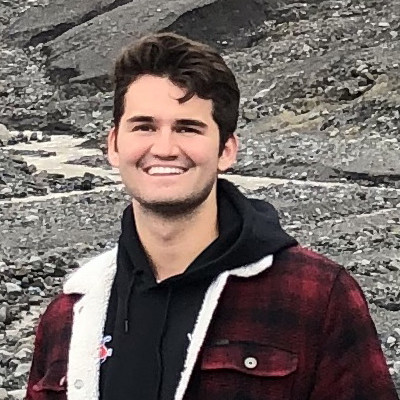 Dylan Radovic is graduating with a bachelor’s degree in Mechanical Engineering from Northwestern's McCormick School of Engineering and Applied Science.
Dylan Radovic is graduating with a bachelor’s degree in Mechanical Engineering from Northwestern's McCormick School of Engineering and Applied Science.
What are your plans after graduation?
Next year, I plan on continuing my academic career at Imperial College London. There, I will be pursuing a Master of Science degree in Sustainable Energy Futures. This one-year program will certainly launch me into a meaningful career within energy and sustainability. I am excited to expand on all that I have learned in my courses at the Institute for Sustainability and Energy at Northwestern (ISEN) from a European standpoint.
How will you pursue energy and/or sustainability in your work? Why do you believe this type of work is important?
Though I am not entering the workforce immediately, I will be continuing to learn more about the myriad of energy and sustainability issues as well as conducting new research at Imperial. Although it is not set in stone yet, I plan on working with Imperial’s Integrated Development of Low-Carbon Energy Systems program to tackle the issue of the evidence that is used by governments and businesses to formulate their strategies around the long-term evolution of energy systems. I am confident that this work will be incredibly beneficial as it will aid governments in organizing their green energy agendas. With governments of all sizes signing bills to reach carbon neutrality, it is necessary to develop models and policies that will lead them in the right direction and in a timely manner.
What did you learn at Northwestern that you will carry with you into the future?
Though I have only spent three out of my four years of college at Northwestern, I have learned many lessons along the way. The most important that I would like to focus on, is to not be afraid. Northwestern, especially ISEN, has helped push me to be more confident regarding my academic work and career pursuits. I am more than thankful for all those who have helped me develop an ambitious, yet still practical, mindset. I want to personally thank Professor Eric Masanet [McCormick] for allowing me to conduct industrial energy efficiency research under his guidance as well as Jeff Henderson [ISEN] for helping me develop my safe water project, NUwater, these past two years. Both have been monumental in helping me understand my career path in energy and sustainability.
Creating Materials to Sustain the Future
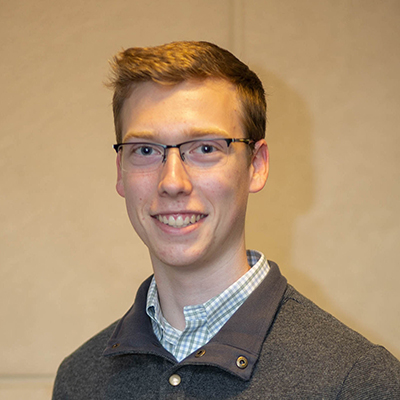 Peter Hosbein is graduating with a bachelor's degree in Materials Science and Engineering from the Northwestern's McCormick School of Engineering and Applied Science and a Design Certificate from its Segal Design Institute.
Peter Hosbein is graduating with a bachelor's degree in Materials Science and Engineering from the Northwestern's McCormick School of Engineering and Applied Science and a Design Certificate from its Segal Design Institute.
What are your plans after graduation?
I will be working at W.L. Gore & Associates as a Product Development Engineer for Electrochemical Products in their Performance Solutions Division. Gore is a materials engineering company focused on applications of ePTFE. Most people know them for Gore-TEX waterproofing in jackets, but I’ll be in the division developing materials for PEM fuel cells, batteries, and electrical components for fuel cell cars and electric vehicles among other things.
I’m moving to Delaware to work at Gore’s Eastern Cluster of plants, but before that I’ll be going back home to Florida and I’m in the process of planning some camping trips with friends in the northwest. I really like being outdoors so I am excited about Gore’s campuses being interspersed with some nice parks in Delaware, and I’ll be close enough to the Appalachian Trail to do some longer hiking and camping on the weekends.
How will you pursue energy and/or sustainability in your work? Why do you believe this type of work is important?
I haven’t been assigned a project yet, but within my department I hope to play a part in developing existing and novel materials that enable renewable power generation, energy storage, and zero emission vehicles. Nearly all of the viable energy storage solutions for the future are electrochemical devices, so I feel like the impact of my work will be to make renewable power more widespread through developing the energy storage devices for load balancing a grid with renewable energy sources.
Gore provides products for a lot of industries, so if I move around within the company, I would still have the opportunity to work in areas related to sustainability. One area that I think would be fun to work in is filtration membranes that allow for solvent reclamation from liquid processes or purifying gasses coming out of coal and gas fired power plants. The impact of reusing chemicals and capturing potential toxins is obvious, but the science that makes it possible is also exciting.
What did you learn at Northwestern that you will carry with you into the future?
I have had the opportunity at Northwestern to work at the intersection of a number of technical disciplines, both locally and internationally. The Institute for Sustainability and Energy at Northwestern (ISEN) helped send me and my design capstone group to Brazil to learn about chocolate from the local cacao farmers and experiment with ways to improve the chocolate making process. This was an experience I will never forget, and I hope to continue to improve my ability to work across fields and cultures, since I see this work providing the greatest opportunity for innovation. No matter what work I am doing at Gore, or possibly another company later on, I think Northwestern’s emphasis on good teamwork across disciplines will serve me well.
Improving Battery Storage
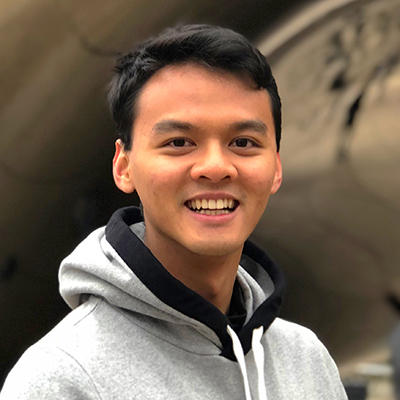 Pitawat Mahawattanangul is graduating with a bachelor's degree in Materials Science and Engineering from Northwestern's McCormick School of Engineering and Applied Science.
Pitawat Mahawattanangul is graduating with a bachelor's degree in Materials Science and Engineering from Northwestern's McCormick School of Engineering and Applied Science.
What are your plans after graduation?
I will be working with NanoGraf Technologies the summer after graduation. They are a startup company that came out of Northwestern University working on improving lithium-ion batteries by using a silicon-based anode material.
How will you pursue energy and/or sustainability in your work? Why do you believe this type of work is important?
With the ever increasing need for renewable and sustainable sources of energy comes a demand for energy storage to deal with their inherent fluctuations. By working to improve battery technology, I believe I am trying to help move the world towards a greener future. I am an avid traveler and often see firsthand the adverse effects that our industries have on the world should we continue to go about doing things in the manner we've been doing them for centuries. In the end, I just want to do my own part in helping us all move in a positive direction.
What did you learn at Northwestern that you will carry with you into the future?
Among the most important things I learned at Northwestern was how to work in an interdisciplinary team and approach problems through a design perspective. The nature of the issues society is facing in the coming years are complex and inherently require solutions that encompasses multiple disciplines. Learning to work with people from different backgrounds to be able to come up with an effective solution for these complex problems is an invaluable skill.
Rethinking Sustainable Agriculture
 Rebecca Fudge is graduating with a bachelor's degree in Biological Sciences (genetics concentration) with minors in World Literature and Environmental Policy & Culture from Northwestern's Weinberg College of Arts and Sciences.
Rebecca Fudge is graduating with a bachelor's degree in Biological Sciences (genetics concentration) with minors in World Literature and Environmental Policy & Culture from Northwestern's Weinberg College of Arts and Sciences.
What are your plans after graduation?
I will begin pursuing a PhD at the University of Minnesota in the fall, specifically studying organic agriculture in Dr. Julie Grossman's lab.
How will you pursue energy and/or sustainability in your work? Why do you believe this type of work is important?
Agriculture is such a central concern in the area of sustainability because many agricultural practices contribute to climate change. At the same time, climate change affects agriculture in a significant, damaging way. My graduate research will center on organic agriculture, specifically looking at rhizobia associations with winter-hardy cover crops that will benefit Midwestern soils. I find this work important because increasing knowledge of effective organic agriculture practices can help make agriculture both more environmentally-friendly and hopefully climate-adaptive.
What did you learn at Northwestern that you will carry with you into the future?
Northwestern definitely taught me the value of curiosity; that is, in large part, what sparked my interest in scientific research. In my career, I hope that curiosity drives me to value many people's perspectives on a problem and to never assume I have all the answers.
Building Sustainable Communities
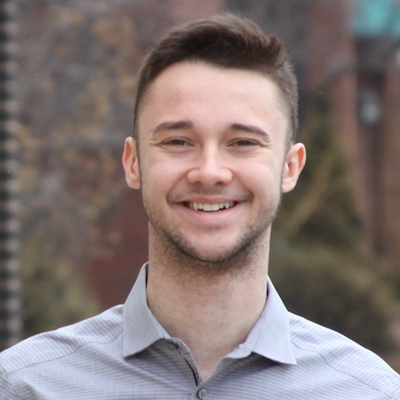 Robinson Markus is graduating with a bachelor's degree in Political Science from Northwestern's Weinberg College of Arts and Sciences and in Radio/ Television/ Film from the School of Communication.
Robinson Markus is graduating with a bachelor's degree in Political Science from Northwestern's Weinberg College of Arts and Sciences and in Radio/ Television/ Film from the School of Communication.
What are your plans after graduation?
After graduation, I will continue my work as the co-founder and Vice President of the Evanston Development Cooperative (EDC). EDC is a local social enterprise that constructs environmentally sustainable, affordable housing by and for Evanston residents. I co-founded EDC in December of 2018 with Dick Co, the former Faculty Director of House by Northwestern. Prior to EDC, I was researching the social effects of cost-burdensome housing in the Evanston community through independent research with Prof. Dan Lewis. In the coming years, I aim to gradually scale our co-op as we take steps towards our vision of a healthy, sustainable Evanston community.
How will you pursue energy and/or sustainability in your work? Why do you believe this type of work is important?
In the City of Evanston, 80% of our city’s carbon emissions currently come from our buildings. EDC’s construction technologies allow us to build a home with superior airtight insulation, creating a building envelope that saves energy, reduces utility bills, and aligns with the City of Evanston’s 2050 carbon neutrality goal. When considering the value of my work, I believe that local, community-driven solutions are necessary to address intimidating issues like climate change, racial inequity, and a lack of accessible housing. I hope EDC can play a small role in the development of stable, prosperous communities for generations to come.
What did you learn at Northwestern that you will carry with you into the future?
During my time at Northwestern, I learned about the value and process of local community development. In my political science honors thesis, I studied how a local government in rural Ecuador executed policy changes which led to increased education, health, and economic development in the community. I paired this work with civic engagement work as a Brady Scholar to provide weatherizing energy audits for low and moderate-income households in the Evanston community. In both academic work on Ecuadorian politics and my local organizing in our own town, I began to understand how and why community residents and institutions should play a role in societal change. Local residents understand the problems of their own town in a different way than the state or a federal government, allowing them to find different, productive solutions when given the resources and capacity.
Meeting Global Energy Demand
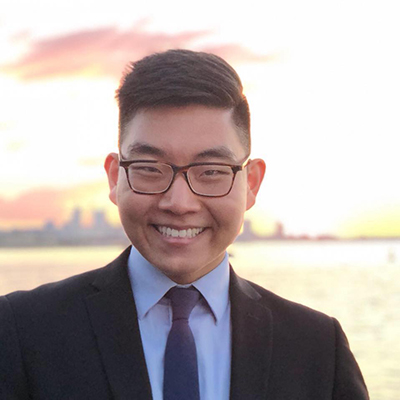 Shane Choi is graduating with a master's and bachelor's degree in Mechanical Engineering from Northwestern's McCormick School of Engineering and Applied Science and bachelor's degree in Trumpet Performance from the Bienen School of Music.
Shane Choi is graduating with a master's and bachelor's degree in Mechanical Engineering from Northwestern's McCormick School of Engineering and Applied Science and bachelor's degree in Trumpet Performance from the Bienen School of Music.
What are your plans after graduation?
After spending two internships at ExxonMobil as an engineer downstream, I am joining ExxonMobil's project management division full time. I will be part of a large project organization that develops new projects and improves existing ones in our energy portfolio. To remain competitive in the industry, my role will help provide guidance on investment decisions for projects.
How will you pursue energy and/or sustainability in your work? Why do you believe this type of work is important?
The world has ever more demanding energy needs. With that, the forms of energy the world needs is changing as well. To adapt, traditional energy industries have the challenge of providing reliable sources of energy but also sustainable ones. I believe that my work will help make a difference in meeting that energy demand in a responsible way.
What did you learn at Northwestern that you will carry with you into the future?
My study abroad experience in China opened my eyes to energy technologies and the rapidly-changing industry. It is also one that applies to everyone, regardless of what country you live in or what language you speak. The engineering experience as a whole with the fast paced quarter system taught me time management skills that apply in all aspects of my life. I also learned that there is no getting around putting in the work to get what you want. Having a core mission is what will motivate me to make a positive impact on the world.





